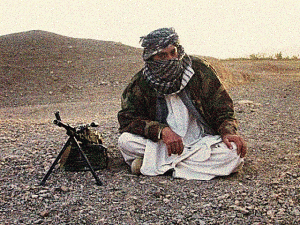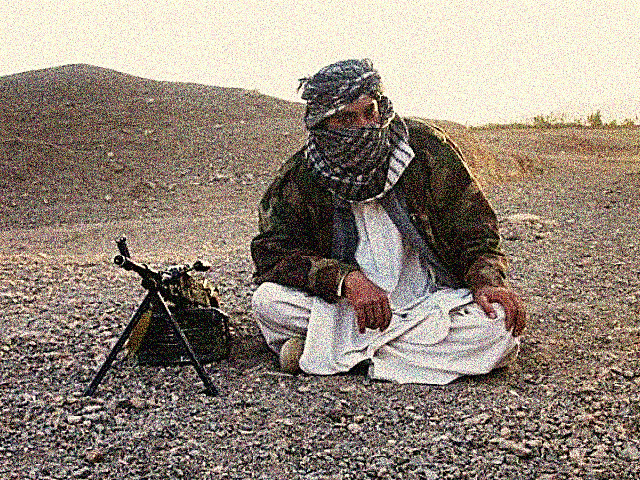 Recent coverage of Afghanistan by Newsweek-slash-the Daily Beast has been illuminating. On December 30 Sami Yousafzai and Ron Moreau wrote:
Recent coverage of Afghanistan by Newsweek-slash-the Daily Beast has been illuminating. On December 30 Sami Yousafzai and Ron Moreau wrote:
“A shroud of anxiety hangs over the coming year in Afghanistan. It’s not only the country’s war-weary civilians who are beset with trepidation and uncertainty—even the Taliban are uncharacteristically worried. … To be sure, the Afghan insurgents unabashedly welcome the impending U.S. troop drawdown. Maybe now they can start to regroup and regain some of the momentum they’ve lost over the past three years. At the same time, however, they’re acutely aware that their ranks have been decimated, while the Americans have worked overtime to transform the Afghan National Army into a credible fighting force. The Taliban’s propaganda department keeps claiming that the ANA is a laughably hollow threat, unable to fill the vacuum left by the departing Western troops. But privately, the guerrillas in the field aren’t sure which side is stronger now.”
Also …
… powerful former warlords are hastening to rebuild and rearm the private armies they commanded during the 1990s, preparing to fight the Taliban—and quite likely each other—once again.
Before that, on December 12, Yousafzai had asked Will the Taliban Destroy Itself?
A serious power struggle has broken out among the Afghan Taliban’s top leaders. … the two top-ranking members of the Afghan insurgency’s ruling council, the Quetta Shura, are battling each other for control. … Some insurgents blame [top-ranking members] Mansoor as well as Zakir for the Taliban’s setbacks. Both men have failed to gain territory in the southern Afghan provinces of Kandahar and Helmand. On the contrary, they have lost control of former Taliban strongholds. “… they’ve started pointing fingers at each other,” says [a] former cabinet minister. … To make the situation worse, he says, none of the other current leaders have any outstanding abilities as military commanders or as leaders.
A former Culture Ministry official told Yousafzai: “Pakistan is sharpening its knife to remove the Taliban like a cancer from its body.”
As one who doesn’t follow Afghanistan as closely as he should, the idea that, once the United States and NATO leave it, Afghanistan will revert to Taliban rule was received wisdom. For added perspective on whether or not that prognosis has been upended, I enlisted the aid of a few colleagues.
Robert Naiman, Policy Director of Just Foreign Policy:
U.S. officials have been cited (not quoted) in the press as saying that when the U.S. leaves, it is de facto ceding control of Taliban-dominated areas to the Taliban. I don’t see how you can credibly call that “losing” for the Taliban. Of course, you can move the goalposts, and say that the Taliban lose if they don’t take Kabul. That the Taliban can be prevented from taking over the whole country seems like a very plausible goal; after all, the Taliban didn’t control the whole country before the U.S. invasion.
Mark Safranski, historian and proprietor of ZenPundit:
The Taliban controlled 95% of Afghanistan before the US invasion.
That was a different Taliban though than what exists today.
The Taliban has several strategic problems, if their goal is ruling Afghanistan as an independent government:
1. They are deeply dependent on the ISI for support, training, intel, safe houses, supplies, etc. Far more so than in 2001. They have not been able to move in large-formation units in open combat as they did against the Northern Alliance in years and most commanders with such experience are long dead. Shaking free of Pakistani Operational control will be very difficult.
2. They remain a radical Pushtun movement. … They are also unpopular and feared which will come to the fore when America withdraws.
3. Without very generous foreign aid, the economy of Afghanistan is going to rapidly implode by orders of magnitude. Resulting in widespread destitution and likely, unrest and militarization of the population as groups scramble to grab what dwindling resources they can from whomever has or will offer any. Only some kind of negotiated settlement will keep the international aid flowing on which the economy of Afghanistan depends. A Taliban victory by force of arms will end that aid, or most of it.
Steve Hynd, editor of the Agonist:
The unstated question is whether preventing the Taliban winning is the same as a victory worth the name. We’re talking about a reset back to the immediate post-Soviet civil war — I wouldn’t call that a win for anyone.
Naiman:
I agree that the situation has changed since before the US invasion. My point was simply that to the extent that the goal is to keep the Taliban from controlling all of Afghanistan, that’s a very realistic and modest goal, because it was true before even the US invaded. There are a whole bunch of folks who don’t want the Taliban to control all of Afghanistan who have the power and willingness to do something about it and have demonstrated that power and willingness in the past: armed Tajiks, India, Russia, Iran, for example. If in addition to everything they had before, they now have US airpower, and if the US accomplished anything in the last 10 years, it stands to reason that the Taliban are going to have a hard time taking back the 95% of Afghanistan they had before.
So, to the extent that some people in the Taliban think that they can restore the pre-US invasion status quo, they are likely to be disappointed. People can call that “losing” if they want. To the extent that their goal is to drive the US out, they can claim victory to the extent that the US leaves. Studies of the insurgency have indicated that fighting the Americans/the foreigners has been a prime motivation for many insurgents. To the extent that that is true, it stands to reason that if the US withdraws, some people are going to say, ok, I accomplished my goal, I defeated the Americans, now there’s no reason for me to die fighting fellow Afghans. In that sense, a US withdrawal will weaken the insurgency, but I don’t think this is the kind of “victory” that the Pentagon originally had in mind.
People in Afghanistan are talking about what happens when the US leaves. That’s good. It causes fear, and that’s not good, but it also makes people talk more realistically about the future. A similar dynamic happened in Iraq when people started to believe that the US was really leaving: they started to focus on other problems. The Taliban will likely come to accept that they can’t control all of Afghanistan; people in Afghanistan who don’t like the Taliban will likely come to accept that the Taliban, in some form, are a permanent feature of the Afghanistan landscape, whether they like it or not. Hopefully, people on both sides who want to live in a unified country in some sense will at some point decide that they prefer accommodation to continued war. It’s beyond of the power of the West to decide when that point will be, but it’s more likely to occur the more the West withdraws its ground troops.
Hynd:
I believe Yousafzai is dead wrong about Pak intentions re: the Taliban. What they’ve been doing is spreading money around with the Pak Taliban to get them to stop attacking Pak assets and ditto for trying to bring the Afghan Taliban back under their full control as a proxy force. Anyone who thinks the Pak military and ISI are going to excise the Taliban like a cancer is either a subject of Kayani’s Jedi mind tricks or smoking Afghan hashish. They’re too valuable a potential proxy — mostly to deny Indian influence, to act as a training ground for other proxy groups and to enable/allow Pakistani strategic maneuvering space in Afghanistan in the event of an Indo/Pak war — and that calculus has not been significantly changed by a decade of US involvement.
Naiman:
I’m not privy to the internals, but common sense broadly supports Steve’s view. If you believe that the ISI and Pakistani military have been pursuing this proxy policy to the extent that they could get away with it for the last 10 years, why would one expect them to cut off the Taliban now? It doesn’t make any sense. Particularly, given that the US is now “leaving,” and that the US recently has made noises in the direction of accommodating Pakistani concerns and trying to bring Pakistan onside in its “reconciliation” plans. If I’m Pakistan, I’m thinking: my policy has been vindicated. Now is not the time to cut; now is the time to play through. To cash in chips Pakistan needs to keep the Taliban as close as they can, not cut them loose. Pakistan’s main value to the US in all this now is not helping the US kill Taliban leaders but helping push Taliban leaders towards a deal.
We’ll give the final word to Naiman:
As for unstated questions, my favorite is: how is the deal that the US can get with the Taliban now better than the deal it could have gotten from the Taliban in 2006? Who considers that difference justified by the additional bloodshed of the last six years?

